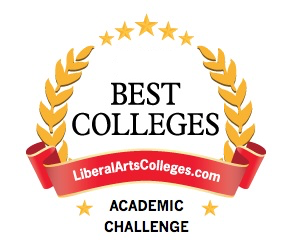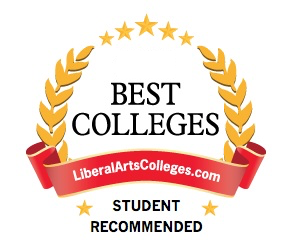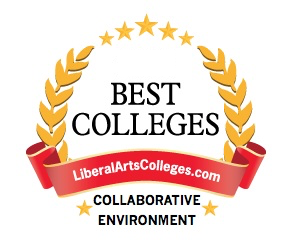
Photo: Carleton College
Carleton is a residential liberal arts college with a student population of roughly 2,000 located in Northfield, Minnesota, around 40 miles south of Minneapolis and St. Paul. The college campus is situated on a hill flanked by agricultural and athletic fields, and, including its Arboretum, covers 1000 acres. There are many opportunities to explore intellectual pursuits and the bucolic natural environment around Carleton proves to be very conducive to learning. Many graduates cite their stay at Carleton as the most memorable and formative years of their lives.
Carleton is consistently ranked among the top colleges in the country, and our Liberal Arts College Student Survey mirrored this. Carleton earned awards in four separate categories, including Highest Student Satisfaction. Carleton’s academic programs in the natural sciences and mathematics are reputed to produce the most prolific professionals. Carleton’s sports teams play in the NCAA Division III and Minnesota Intercollegiate Athletic Conference (MIAC).
School History
While Carleton College is now non-sectarian, the school was founded by the Minnesota Conference of Congregational Churches in 1866. The original name of Carleton was Northfield College. The first benefactors of the school were Charles Augustus Wheaton and Charles M. Goodsell, local businessmen in Minnesota, who donated their land to the first campus. The college was renamed in 1871, in honor of William Carleton, one of the school’s earliest benefactors.
As can be expected from a school developed in the 1800s, many of Carleton’s older buildings are considered historic places, including the first building, Willis Hall. Another historical landmark on campus is the Goodsell Observatory, which was constructed in 1887 and acclaimed as the largest state observatory at that time.

Photo: Carleton College
Academics
Featuring a unique three term calendar, Carleton’s academic program provides students with 39 majors to choose from, as well as the option to develop a personal, or hybrid field of study, but this is only the tip of the iceberg. Both students and faculty take part in genuine academic research ranging in fields from art to science. At any given time, you can find students engaged in scholarly projects of their own design, or working with faculty in a team setting. Research by the Carleton faculty themselves is ongoing, rigorous, and noteworthy.
Known for its academic excellence, Carleton also takes a certain responsibility for academic innovation. There are a number of initiatives and “centers,” outside the normal classroom experience, that focus on specific aspects of academia. These centers range all the way from ethical to quantitative inquiry. The centers are not only for the students; faculty members learn and share among one another, keeping Carleton academics and research on the leading edge, and students fully engaged.
Despite the high standards of academic performance and dedication to learning, the environment at Carleton is relaxed. Most of the students are independent and self-motivated; they take the rigorous curriculum in stride, due in part to motivation, as well as support from their professors and peers. Students are encouraged to ask questions and join in-depth discussions, which is easy because the average class sizes is just 18 students – much smaller than you would find at a big university. Another of the awards that Carleton achieved in our annual survey of liberal arts college students was for Collaborative Environment, and this factor is also one of the hallmarks of a Carleton education.

Photo: Carleton College
Campus Life
A full calendar of well attended, school sponsored, campus events keeps students involved and active. A part of this is the ‘renowned’ plethora of student organizations that allows a full expression of interests and ideas for any area you may want to explore. At last count, there were 250 student organizations at Carleton, and there is still room to grow this number. Supporting a blog, student exhibitions, and a calendar of its own, the vibrant and flourishing arts community is yet another integral part of life at Carleton.
All freshmen must reside in the residence halls, which are equipped with everything that a student needs in order to make the adjustment to college life, including laundry facilities, television and a common lounge. Upperclassmen volunteers are around to provide guidance and assistance when the freshmen need them. No matter what the housing condition, exciting activities that contribute to the creation of a well-rounded individual are always present. Because of the strength of community at Carleton College, it’s possible for students to form lasting friendships and connections.
The well-maintained residence halls and other housing options are many and varied, and they truly become the home away from home for Carleton students. Students can apply for a spot in a residence hall during freshman year, and then move on to a shared-interest house or a townhouse in the surrounding residential neighborhood of Northfield. Shared-interest housing options are great for those that wish to live with individuals that have similar hobbies or interests.

Photo: Carleton College
Financial Aid
Paying for a Carleton education is not as pricey as some students and their parents may think. For the class of 2019, the average aid award by Carleton to students in need was in excess of $45,000, making the $60,000+ sticker price seem much more manageable. Moreover, the average grant offered by Carleton topped $36,000. In addition to this, many students bound for Carleton are already qualified for financial aid in terms of loans, government grants and work-study programs. The Carleton financial aid department strives to meet 100% of demonstrated need for every student.
The scholarship and grants are need-based, and are awarded to students after thorough calculation of the student’s and family’s ability to contribute to the expenses. The financial aid amount awarded is the difference between the total cost of education at Carleton and the family’s contribution.
Carleton takes the cost of a college education seriously by offering a “comprehensive fee” package so that students and their parents are not run down by additional expenses; labs, field trips and the like are all included in the cost of a Carleton education, and a Carleton education can be priceless to a student interested in genuine liberal arts scholarship and true academic innovation.

Photo: Carleton College
What Students Say about Carleton
“At Carleton, people are kind to each other and oriented toward collaborative learning. Also, people really take advantage of the resources and opportunities on campus, and encourage others to do the same. It’s a great learning environment, and a great place to live.” – Carleton junior
“The students and teachers are just so accepting. Most everyone is supportive, and wants to see you do well and pursue your interests. The classes are amazing, and there’s so many extracurricular clubs and teams to join, I never know how I manage to get my work done!” – Carleton sophomore
“It is one of those few places where your professor can become both your friend and teacher. The support by the faculty, student body and administration is incredible.” – Carleton junior
“The winters at Carleton may be extremely cold, but the people are extraordinarily warm. There is this friendly, welcoming vibe on campus that welcomes everyone, even prospective students. Carleton’s academics are also extremely supportive and collaborative.” – Carleton junior
Rankings
2017 College Rankings



